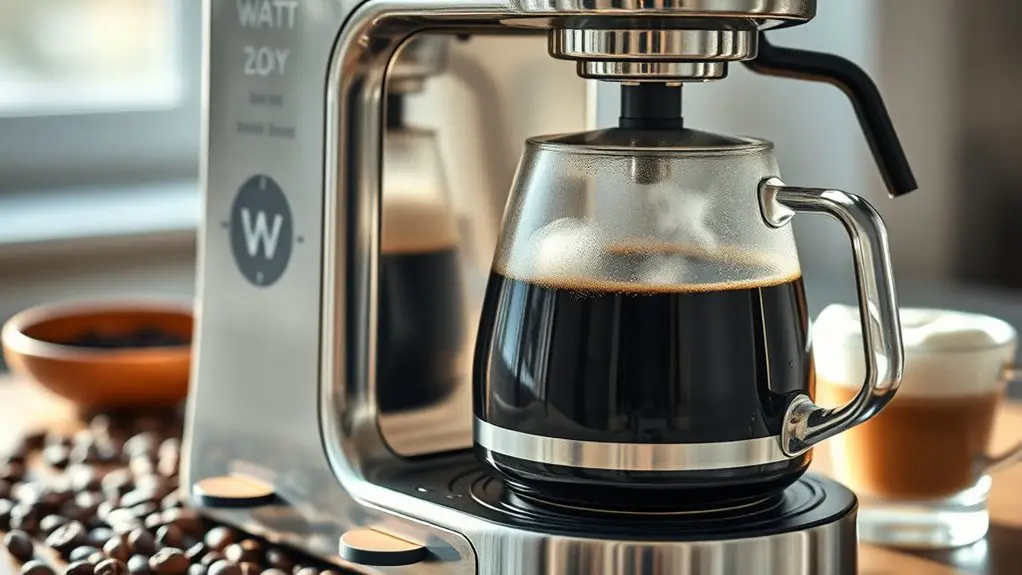Yes, a coffee maker's wattage greatly impacts brew quality. Higher wattage means quicker heating times, which helps maintain consistent temperatures essential for ideal extraction. Ideally, water needs to be between 195°F and 205°F for balanced flavor. If the wattage is low, you risk longer brew times and potential under-extraction, leading to weak coffee. Understanding these factors can help you choose the right machine for your preferences, enhancing your coffee experience. There's more to explore about this topic.
Understanding Wattage in Coffee Makers
When choosing a coffee maker, understanding wattage is vital, as it directly impacts brewing efficiency and quality. Higher wattage typically translates to quicker heating times, which can enhance your coffee-making experience. For instance, a machine with 1000 watts often brews coffee faster than one at 600 watts, enabling you to enjoy your brew without a long wait. Furthermore, wattage effects extend to the overall extraction process; machines with sufficient wattage can maintain ideal temperatures, promoting better flavor extraction from coffee grounds. This efficiency is essential for those who value both convenience and taste. Ultimately, selecting a coffee maker with the right wattage not only saves time but also guarantees you're getting the best quality brew possible.
The Role of Temperature in Brew Quality
Temperature plays an essential role in determining the quality of your coffee brew. The right brew temperature directly influences extraction efficiency, affecting flavor and aroma. Ideally, water should be between 195°F and 205°F for ideal results. Too low, and you risk under-extraction; too high, and over-extraction occurs, leading to bitterness.
| Brew Temperature | Extraction Efficiency | Flavor Profile |
|---|---|---|
| Below 195°F | Low | Sour, weak |
| 195°F – 205°F | Ideal | Balanced, rich |
| Above 205°F | High | Bitter, harsh |
Brew Time and Its Impact on Flavor
Brew time considerably influences the extraction process, which in turn affects the flavor of your coffee. A longer brew time allows for more thorough brew extraction, pulling essential oils, acids, and sugars from the coffee grounds. This can enhance the complexity of your flavor profile, yielding a richer and more nuanced cup. Conversely, if your brew time is too short, you risk under-extraction, resulting in a flat or sour taste. Ideal brew time varies depending on your coffee type and grind size, but generally, aiming for 4 to 6 minutes is perfect for drip methods. By fine-tuning your brew time, you can achieve a well-balanced flavor that satisfies your palate, creating a coffee experience that truly aligns with your preferences.
Comparing High and Low Wattage Coffee Makers
Although the wattage of your coffee maker may seem like a minor detail, it can greatly impact both brewing efficiency and the overall quality of your cup. High wattage coffee makers typically heat water faster, allowing for quicker brew times, which can enhance flavor extraction. They're especially effective when you're brewing larger quantities, ensuring consistent temperatures throughout the process. On the other hand, low wattage models may lead to longer brewing times and potential under-extraction, resulting in a flat taste. However, some coffee enthusiasts argue that slower brewing can allow for nuanced flavor profiles. Ultimately, choosing between high and low wattage models hinges on your brewing preferences and desired flavor outcome. Consider how each option aligns with your quest for the perfect cup.
Tips for Choosing the Right Coffee Maker for Your Needs
How do you determine which coffee maker is right for you? Start by evaluating your user preferences and the specific coffee maker features that matter most. Consider the following:
Evaluate your preferences and essential features to find the perfect coffee maker that fits your lifestyle and brewing needs.
- Brew Type: Do you prefer drip, espresso, or single-serve?
- Capacity: How much coffee do you typically brew at once?
- Ease of Use: Are you looking for programmable settings or a more manual approach?
These factors will help narrow down your options. Additionally, think about your lifestyle—do you need a quick brew for busy mornings, or are you willing to invest time in the perfect cup? By aligning your choices with your needs, you'll find a coffee maker that enhances your coffee experience, giving you the freedom to enjoy every sip. Moreover, regular maintenance is crucial to ensure optimal performance and brew quality over time.
Frequently Asked Questions
Does Wattage Affect the Lifespan of a Coffee Maker?
Wattage can influence a coffee maker's durability. Higher wattage might lead to quicker heating but can also strain components. Regular coffee maker maintenance is essential to guarantee longevity, regardless of wattage. Your choices matter in this balance.
Can Wattage Influence the Coffee's Aroma?
Wattage can indeed influence aroma intensity. Higher wattage typically means faster heating, leading to ideal brewing temperature. This guarantees more flavorful oils and compounds are extracted, enhancing the aroma and overall coffee experience you enjoy.
Is Higher Wattage Better for All Coffee Types?
Higher wattage can improve brewing temperature and reduce extraction time, but it isn't universally better for all coffee types. Each coffee's characteristics require specific conditions, so balance wattage with the desired flavor profile for ideal results.
How Does Wattage Relate to Energy Efficiency?
Think of wattage as a car's engine size; higher wattage can lead to greater energy consumption. However, efficiency ratings help you gauge how effectively your coffee maker uses that power, balancing performance and sustainability.
Does Wattage Impact the Noise Level of Brewing?
Wattage doesn't directly impact brewing sound, but higher wattage machines may create more vibrations, leading to increased noise. You'll find that design and build quality often play a more significant role in overall sound levels.
